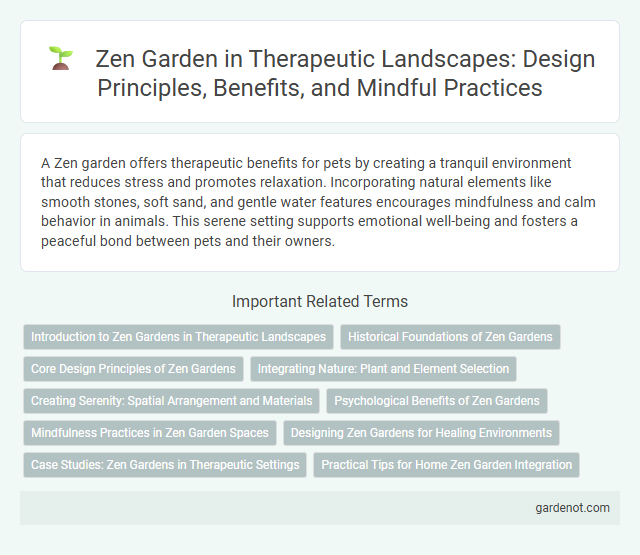A Zen garden offers therapeutic benefits for pets by creating a tranquil environment that reduces stress and promotes relaxation. Incorporating natural elements like smooth stones, soft sand, and gentle water features encourages mindfulness and calm behavior in animals. This serene setting supports emotional well-being and fosters a peaceful bond between pets and their owners.
Introduction to Zen Gardens in Therapeutic Landscapes
Zen gardens, also known as Japanese rock gardens or karesansui, are integral to therapeutic landscapes for their minimalist design and meditative qualities. Comprising raked gravel, strategically placed rocks, and sparse vegetation, these gardens promote mindfulness, stress reduction, and emotional balance. Their intentional simplicity fosters a tranquil environment conducive to mental clarity and holistic healing.
Historical Foundations of Zen Gardens
Zen gardens, also known as karesansui, originated in 14th-century Japan during the Muromachi period, reflecting the aesthetic principles of Zen Buddhism. These gardens employ minimalist design elements such as rocks, gravel, and sparse vegetation to symbolize natural landscapes and promote meditation. Rooted in Chinese garden traditions, their historical development emphasizes simplicity, tranquility, and the spiritual connection between nature and the mind.
Core Design Principles of Zen Gardens
Zen gardens embody core design principles such as simplicity, asymmetry, and naturalness to create a therapeutic landscape that fosters mindfulness and tranquility. Elements like raked gravel symbolize water, encouraging contemplation and mental clarity, while carefully placed rocks represent mountains or islands to evoke balance and harmony. The minimalist design emphasizes spatial openness and intentionality, supporting stress reduction and emotional well-being.
Integrating Nature: Plant and Element Selection
Zen gardens integrate nature through carefully selected plants such as moss, bamboo, and pine, which symbolize simplicity and tranquility. Elements like rocks, sand, and water are strategically placed to create symbolic representations of natural landscapes, enhancing mindfulness and meditation. The deliberate arrangement fosters a therapeutic environment by promoting balance, calmness, and connection to the natural world.
Creating Serenity: Spatial Arrangement and Materials
Zen gardens utilize carefully arranged spatial elements and natural materials like gravel, rocks, and moss to evoke tranquility and mindfulness. The deliberate placement of stones and the raked patterns in gravel symbolize harmony and balance, fostering deep relaxation. Incorporating organic textures and minimalist design enhances the therapeutic experience by minimizing distractions and promoting mental clarity.
Psychological Benefits of Zen Gardens
Zen gardens promote psychological well-being by reducing stress and enhancing mindfulness through their minimalist design and natural elements. The carefully arranged rocks, sand, and plants encourage meditation and mental clarity, fostering a sense of inner peace and emotional balance. Regular interaction with Zen gardens has been linked to decreased anxiety levels and improved overall mental health.
Mindfulness Practices in Zen Garden Spaces
Zen garden spaces serve as powerful therapeutic landscapes that promote mindfulness through carefully designed natural elements such as raked gravel, stones, and minimalist vegetation. These environments encourage focused breathing and meditation, reducing stress and enhancing mental clarity by fostering present-moment awareness. Research shows that regular engagement with Zen garden mindfulness practices can improve emotional regulation and cognitive function, making these spaces vital for holistic well-being.
Designing Zen Gardens for Healing Environments
Designing Zen gardens for healing environments integrates principles of simplicity, balance, and natural materials to create tranquil spaces that promote mental clarity and emotional restoration. Incorporating elements such as raked gravel, strategically placed stones, and native plantings fosters mindfulness and reduces stress for patients and caregivers. These therapeutic landscapes enhance healing by encouraging contemplation and connection to nature within healthcare settings.
Case Studies: Zen Gardens in Therapeutic Settings
Zen gardens in therapeutic settings have demonstrated significant benefits in reducing patient stress and enhancing mindfulness through sensory engagement with natural elements like sand, rocks, and water features. Case studies from healthcare facilities reveal improved patient outcomes, including decreased anxiety levels and elevated emotional well-being, when Zen gardens are incorporated into recovery spaces. These therapeutic landscapes promote calming interactions and meditative experiences, reinforcing their role as effective adjuncts in mental health treatment and rehabilitation programs.
Practical Tips for Home Zen Garden Integration
Incorporate natural elements such as smooth stones, raked sand, and minimalist plants like bamboo or moss to enhance the calming effect of a home Zen garden. Position the garden in a quiet, well-lit area to promote mindfulness and stress reduction during daily use. Regular maintenance, including gentle raking and pruning, supports the therapeutic benefits by encouraging intentional, meditative care practices.
Zen garden Infographic

 gardenot.com
gardenot.com